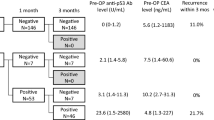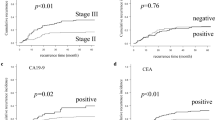Abstract
Purposes
Recently, the serum p53 antibody (S-p53Ab) has been used widely in clinical practice as a tumor marker for colorectal cancer (CRC). However, no large-scale studies have examined the usefulness of serial measurements of S-p53Ab or have established the relationship of this parameter with the clinicopathological factors of CRC.
Methods
An ELISA for S-p53Ab was performed for 1384 primary CRC patients, and the results were categorized by the clinicopathological factors.
Results
The S-p53Ab positivity rate was 24.1 %, and was significantly higher in Stage III–IV than in Stage 0–II cases. However, no relationship was seen with the serum carcinoembryonic antigen (CEA) or carbohydrate antigen 19-9 (CA19-9) levels. The addition of the S-p53Ab assay to the CEA and CA19-9 measurements increased the overall diagnostic sensitivity to 50.9 % (CEA and/or CA19-9: 37.3 %). In patients who had undergone complete resection, S-p53Ab positivity was associated with a decrease in the relapse-free survival (p = 0.012), but it was not independent prognostic indicator. S-p53Ab positivity had no influence on the cancer-specific survival.
Conclusions
The S-p53Ab positivity rate was higher than the positivity rates for CEA and/or CA19-9 in Stage 0–I CRC patients. Combining the use of the three tumor marker tests is a potentially effective method for detecting even early-stage CRC.



Similar content being viewed by others
References
Angelopoulou K, Stratis M, Diamandis EP. Humoral immune response against p53 protein in patients with colorectal carcinoma. Int J Can. 1997;70:46–51.
Shimada H, Nakajima K, Ochiai T, Koide Y, Okazumi SI, Matsubara H, et al. Detection of serum p53 antibodies in patients with esophageal squamous cell carcinoma: correlation with clinicopathologic features and tumor markers. Oncol Rep. 1998;5:871–4.
Wurl P, Weigmann F, Meye A, Fittkau M, Rose U, Berger D, et al. Detection of p53 autoantibodies in sera of gastric cancer patients and their prognostic relevance. Scand J Gastroenterol. 1997;32:1147–51.
Shimada H, Ochiai T, Nomura F, Japan p53 Antibody Research Group. Titration of serum p53 antibodies in 1,085 patients with various types of malignant tumors: a multiinstitutional analysis by the Japan p53 antibody research group. Cancer. 2003;97:682–9.
Ochiai H, Ohishi T, Osumi K, Tokuyama J, Urakami H, Seki S, et al. Reevaluation of serum p53 antibody as a tumor marker in colorectal cancer patients. Surg Today. 2012;42:164–8.
Sobin LH, Gospodarowicz MK, Wittekind C. TNM classification of malignant tumours. 7th ed. New York: Wiley-Blackwell; 2009.
Angelopoulou K, Diamandis EP, Sutherland DJ, Kellen JA, Bunting PS. Prevalence of serum antibodies against the p53 tumor suppressor gene protein in various cancers. Int J Can. 1994;58:480–7.
Tang R, Ko MC, Wang JY, Changchien CR, Chen HH, Chen JS, et al. Humoral response to p53 in human colorectal tumors: a prospective study of 1,209 patients. Int J Can. 2001;94:859–63.
Lechpammer M, Lukac J, Lechpammer S, Kovacević D, Loda M, Kusić Z. Humoral immune response to p53 correlates with clinical course in colorectal cancer patients during adjuvant chemotherapy. Int J Colorectal Dis. 2004;19:114–20.
Kressner U, Inganas M, Byding S, Blikstad I, Påhlman L, Glimelius B, Lindmark G. Prognostic value of p53 genetic changes in colorectal cancer. J Clin Oncol. 1999;17:593–9.
Peyrat JP, Bonnetterre J, Lubin R, Vanlemmens L, Fournier J, Soussi T. Prognostic significance of circulating p53 antibodies in patients undergoing surgery for loco-regional breast cancer. Lancet. 1995;345:621–2.
Angelopoulou K, Rosen B, Stratis M, Yu H, Solomou M, Diamandis EP. Circulating antibodies against p53 protein in patients with ovarian carcinoma. Cancer. 1996;78:2146–52.
Shiota G, Kishimoto Y, Suyama A, et al. Prognostic significance of serum anti-p53 antibody in patients with hepatocellular carcinoma. J Hepatol. 1997;27:661–8.
Shiota G, Ishida M, Noguchi N, Oyama K, Takano Y, Okubo M, et al. Circulating p53 antibody in patients with colorectal cancer: relation to clinicopathologic features and survival. Dig Dis Sci. 2000;45:122–8.
Houbiers JG, van der Burg SH, van de Watering LMG, Okubo M, Katayama S, Harada K, et al. Antibodies against p53 are associated with poor prognosis of colorectal cancer. Br J Can. 1995;72:637–41.
Suppiah A, Alabi A, Madden L, Hartley JE, Monson JR, Greenman J. Anti-p53 autoantibody in colorectal cancer: prognostic significance in long-term follow-up. Int J Colorectal Dis. 2008;23:595–600.
Conflict of interest
Yamaguchi Tetsuji, Takii Yasumasa and Maruyama Satoshi have no conflicts of interest or financial ties to disclose.
Author information
Authors and Affiliations
Corresponding author
Rights and permissions
About this article
Cite this article
Yamaguchi, T., Takii, Y. & Maruyama, S. Usefulness of serum p53 antibody measurement in colorectal cancer: an examination of 1384 primary colorectal cancer patients. Surg Today 44, 1529–1535 (2014). https://doi.org/10.1007/s00595-013-0703-5
Received:
Accepted:
Published:
Issue Date:
DOI: https://doi.org/10.1007/s00595-013-0703-5




